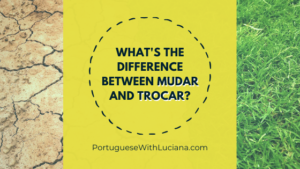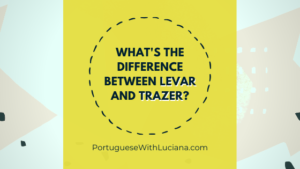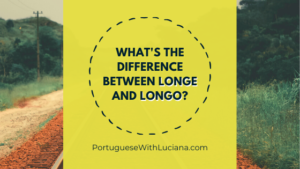As a student of the Portuguese language, have you ever wondered or got curious about the different varieties of the language?
Did you know Portuguese is spoken by 250 million people, but 209 million are Brazilians?
I’m a teacher of Brazilian Portuguese who moved to Portugal in 2014, after two years living in Spain. With a bit of shame, I admit that I only got interested in the “other Portugueses” when I started teaching Brazilian Portuguese and a few of my students wanted to learn more about Portuguese spoken in Portugal and Africa.

They asked me questions like: “if I speak Brazilian Portuguese in Portugal, are they going to understand me?” or “if I study Brazilian Portuguese with you, am I going to be able to have conversations with people in Mozambique?” I wasn’t sure about the answer because that was not part of my personal experience at the time. Just when I came to live in Portugal, I felt I could give a better answer to my students.
I still remember when I first arrived in Lisbon and asked about a pastry in a shop and the guy answered something like “tortddocd’ovo”. I asked him to repeat three more times and, embarrassed, I ended up choosing something else.
Just after leaving the place, I realized he said doce de ovo (sweet egg cream), but I still couldn’t understand why he was saying torta (pie in Brazilian Portuguese) if I was asking about a rocambole (Swiss roll).
Now I’ve been living in Portugal for more than six years, but sometimes I still ask myself:
Is Brazilian Portuguese and European Portuguese the same language?
The answer is yes, Brazilian Portuguese is a variety of the Portuguese language (although sometimes I feel like the answer should be no!).
When I first arrived, I needed to learn and get used to asking about T1 or T2, rés do chão, casa de banho, and assoalhada to rent an apartment.
Then I discovered the name of many Portuguese pastries that we have no idea of in Brazil. I had to learn the names of government agencies and documents, and I thought it made sense these names were all different from Brazilian names.
So why are there differences? History is the answer!
Portuguese came to what is Brazil today in 1500, and in September 1822, Independence was declared. During these years, the Portuguese language brought by explorers was influenced by the natives’ language, by the African languages spoken by the Africans taken to Brazil to work as slaves, by European languages, when the Dutch and French invaded the land.
In 1808, the Portuguese court was transferred to Brazil fleeing Portugal because Napoleon invaded Lisbon. They say around 15,000 people came with the court! They stayed in Rio de Janeiro and until 1822 it became the capital city of the Portuguese Empire.
During these 14 years, the Portuguese spoken in Rio de Janeiro got more influenced by the Portuguese from Portugal.
After 1822 other European immigrants started to arrive in Brazil such as Spanish, Italian, or German adding more words and accents to the mix!
Languages evolve, and even the variety of Portuguese spoken here in Portugal nowadays is not the same spoken more than 500 years ago when they first arrived in Brazil.
To sum up, the Portuguese language spoken in Brazil nowadays is a combination of Portuguese brought to Brazil serving as a base + natives’ languages + African languages + other European languages. So if you are interested in languages and how it mixes and evolves, I may be biased, but I believe Brazilian Portuguese is a great one to study!
Portuguese people have travelled around the globe during maritime exploration in the 15th and 16th centuries, reached and influenced many places. So if you want a list of all Portuguese speaking countries (países lusófonos), here you have it: Angola, Brazil (Brasil), Cape Verde (Cabo Verde), Guinea-Bissau (Guiné-Bissau), Equatorial Guinea (Guiné Equatorial), Mozambique (Moçambique), Portugal, São Tomé and Príncipe (São Tomé e Príncipe) and East Timor (Timor-Leste). You can check more about these countries here: CPLP – Comunidade dos Países de Língua Portuguesa
So here comes a frequent question and an understandable concern from students:
If I learn Brazilian Portuguese, am I going to understand European Portuguese?
My first answer is no. If you only have contact with Brazilian Portuguese, the first time you listen to European Portuguese it will sound like a completely unrelated language. But it is just a matter of adapting and you will start understanding.
This is what I did when I arrived in Portugal: every time I interacted with a Portuguese person I prepared myself to listen to an accent that was not in the range of accents I’ve heard previously. I had to pay more attention as if I were hearing a foreign language until I got used to the accent and rhythm.

In the beginning, I would take mental notes of how I heard some words and letters.
Like in my first time in Lisbon, I remember when my husband and I were waiting for a tram (elétrico or bonde) to Belém, and a woman next to us was saying blein, blein. I thought, why is she making that noise? That was when I realized she was saying Belém, but not pronouncing both vowels as we would do in Brazilian Portuguese.
I would also take mental notes of new vocabulary for future occasions. The first time I ordered a café com leite (coffee and milk), they asked me if I wanted galão or meia de leite. Of course, they had to explain each one so I could choose what I wanted.
I think it is the same for any student in any foreign country. You will interact with locals. Maybe understand everything, maybe not. Maybe they will speak slowly for you, maybe they won’t care if you are learning the language, but you will learn something with these interactions anyway. Something to add to your experience that you will remember later for future interactions or for the next time you go to the same place and talk to the same person and then you understand everything.
And this is what happened to me. It is a frequent question of my students if I speak European Portuguese here. No, I use my Brazilian accent with Portuguese words that I’ve been learning since I arrived in this land.
If I talk about transportation I use comboio and autocarro instead of trem and ônibus that I would use in Brazil. When I pay I ask if I can use multibanco instead of cartão.
When I started thinking on this blog post I did a kind of a mental map of vocabulary areas. I thought about vocabulary for the house and things in the house, yes, there are differences. Clothing, yes, there are differences. And the same goes for technology, transportation, food in restaurants, supermarkets, open markets to medical exams, swear words, etc.
As I entered this field of differences, let’s see them in more detail!
What are the differences between Portuguese and Brazilian Portuguese?
Vocabulary
As I said before there are lexical differences in all areas. Using the examples I mentioned above, let’s see how to call them in both variants:
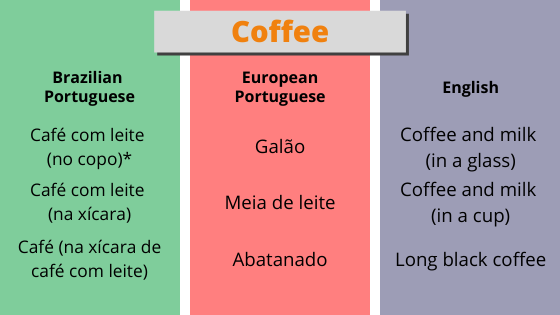
You can read more about coffee here in Portugal in these two pages: in Portuguese and in English. The truth is: there are so many ways to order coffee or coffee and milk here in Portugal and I didn’t know the equivalents in Brazil (or at least in my region in Brazil). Maybe galão in Portugal could be pingado in Brazil, but I think pingado is smaller than galão with less coffee.
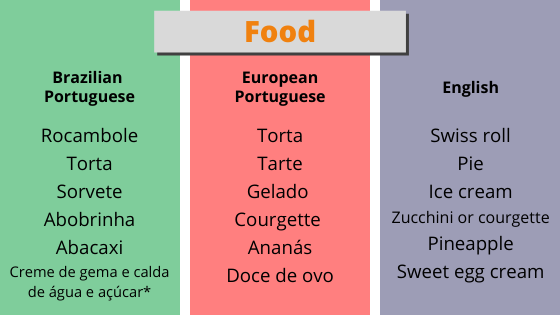
From the words above I think ananás/abacaxi is a very interesting example of language mixing. While researching for this blog post I checked the etymology of ananás, the word for pineapple in Portugal and it comes from Guarani and Old Tupi languages. It was first documented in Portuguese in the 16th century. While abacaxi, the word we use in Brazil, is from the Tupi language and was first documented in the 19th century.
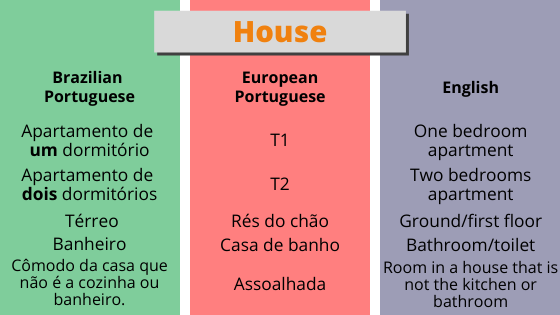
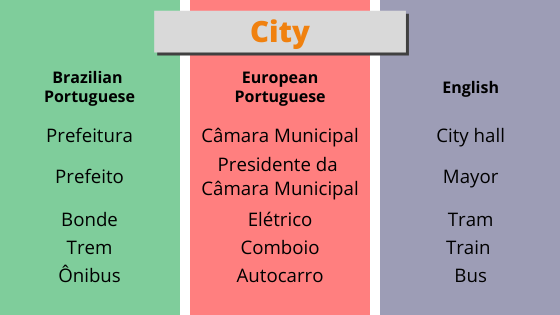
Above you can see some words I learned in Portugal to rent our first apartment. I really like using T1, T2, etc, it’s more practical. 🙂
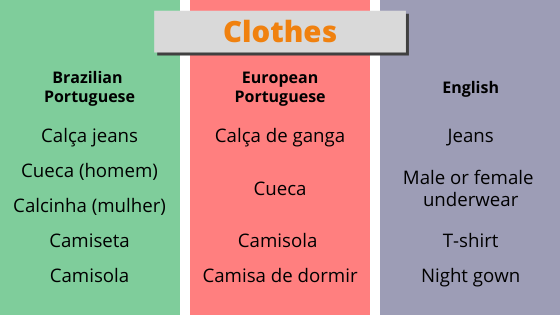
As I don’t buy many clothes, I’m not used to talking about them when I need to, but last time in a second hand shop, the owner and I were talking about the names in Brazil and Portugal, as an exchange lesson for me and for her! 🙂
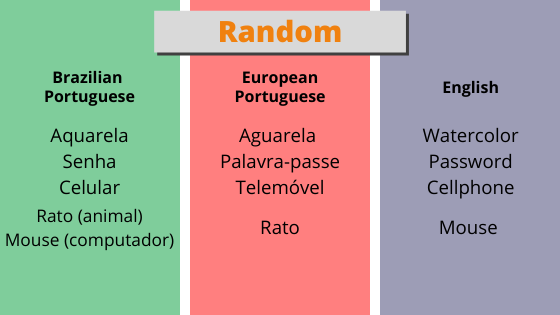
And if there is one word that I refuse to use here in Portugal, it is the word rato! For me, in Brazil, when I say rato it refers to mouse the animal only and when I say mouse (in English), it is the computer mouse only! So the only time I needed to ask for one rato here in Portugal I tried to make up my mind to ask about rato. But when it came out of my mouth, I said mouse!
Grammar/structures
When talking about grammatical differences between Brazilian and European Portuguese the first one that comes to mind is the use of tu and você. Here in Portugal tu is informal you, and você is formal you. And here verbs are conjugated differently:
Foste ontem ao cinema? in European Portuguese
Você foi ontem ao cinema? in Brazilian Portuguese
Tu is also used in Brazil, but not in the whole country and the verb is not well conjugated most of the time. In Brazil, you’d hear the example above as tu foi ontem ao cinema?.
Here you can listen to Carminho, a portuguese singer with Arnaldo Antunes, who is from São Paulo, singing Vilarejo together: https://youtu.be/TGBC6ih92Z8. Arnaldo sings: para quando você for, while Carminho changes to tu fores.
There is also the use of a gente + verb in 3rd person singular in Brazil referring to nós while a gente here in Portugal means the people.
Another difference is the use of continuous tense. In Brazil, we state continuous tense with estar + gerund (eu estou escrevendo). Here in Portugal, they use estar a + infinitive (eu estou a escrever).
 When we talk about the placement of reflexive pronouns, direct and indirect object pronouns the order is also different in European and Brazilian Portuguese. Here in Portugal, the normal order is to put the pronoun after the verb. While in Brazil, the typical placement is before or between verbs if there is more than one verb. Of course, in formal writing there are rules to be followed regarding pronoun placement. See the sentences below:
When we talk about the placement of reflexive pronouns, direct and indirect object pronouns the order is also different in European and Brazilian Portuguese. Here in Portugal, the normal order is to put the pronoun after the verb. While in Brazil, the typical placement is before or between verbs if there is more than one verb. Of course, in formal writing there are rules to be followed regarding pronoun placement. See the sentences below:
Dá-me um café. in European Portuguese
Me dá um café. in spoken Brazilian Portuguese
Above you have just a few examples of differences, but there are many more!
Accent
As you may imagine from this text, for me the accent was the hardest to get when I moved to Lisbon.
Mmany times when walking around the city my husband and I thought we were hearing Russian or a Slavic language, but it was European Portuguese! Until we watched this video and these sound similarities were explained.
What was harder to understand at the beginning was the vowel reductions that resulted in consonant clusters.
I remember when I was on the phone to buy the Internet for our apartment, and the woman was saying telefone and televisão in a way that sounded like tlfon and tlvisão. As they only pronounce the stressed vowels, the words result in a combination of consonants.In Brazil we pronounce all vowels.
Are there more resources for Brazilian Portuguese? Which one is better to learn?
First, I should say that there is no better or more correct Portuguese to learn. As you read above, the Portuguese language has evolved and changed over time as any language, both in Brazil and in Portugal.

You are one to decide if you want to speak Brazilian or European Portuguese because you know your objectives! If you are moving to work in Brazil, it is better to learn Brazilian Portuguese. If you want to come and study in a Portuguese University, it makes more sense to learn European Portuguese.
If you are a polyglot or language curious and want to add another language to your list, you have to see which one you like best!
It seems there are more resources to learn Brazilian Portuguese but I guess it is just because there are more people in Brazil, therefore more people creating material. It doesn’t mean you won’t find good European Portuguese, though!
If you want to check some videos about Brazilian and European Portuguese, here you have them:
Gregório Duvivier (Brazilian) and Ricardo Araújo Pereira (Portuguese) – https://youtu.be/hK0zHiZpHWI?t=628
O paraíso são os outros, by Valter Hugo Mãe, read in Portuguese by people from different places – https://youtu.be/nndGk1Ci2Bo
Turista brasileiro, Porta dos Fundos: https://youtu.be/mItx5E5-rck
Brasileirada, Porta dos Fundos: https://youtu.be/mQKjb3_m14Y

